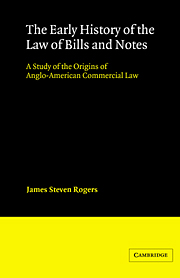 The Early History of the Law of Bills and Notes
The Early History of the Law of Bills and Notes Book contents
- Frontmatter
- Contents
- Preface
- Table of cases and precedents
- Note on citation
- Introduction
- 1 The central courts, commercial law, and the law merchant
- 2 Early exchange transactions: commercial practice
- 3 Early exchange transactions: private law
- 4 Early exchange transactions: public law and policy
- 5 From exchange transactions to bills of exchange: the transformation of commercial practice
- 6 The custom of merchants and the development of the law of bills
- 7 The civilians and the law of bills in the seventeenth century
- 8 Transferability and negotiability
- 9 The law of bills and notes in the eighteenth century
- 10 The problem of accommodation bills
- Conclusion
- Bibliography
- Index
Introduction
Published online by Cambridge University Press: 22 September 2009
- Frontmatter
- Contents
- Preface
- Table of cases and precedents
- Note on citation
- Introduction
- 1 The central courts, commercial law, and the law merchant
- 2 Early exchange transactions: commercial practice
- 3 Early exchange transactions: private law
- 4 Early exchange transactions: public law and policy
- 5 From exchange transactions to bills of exchange: the transformation of commercial practice
- 6 The custom of merchants and the development of the law of bills
- 7 The civilians and the law of bills in the seventeenth century
- 8 Transferability and negotiability
- 9 The law of bills and notes in the eighteenth century
- 10 The problem of accommodation bills
- Conclusion
- Bibliography
- Index
Summary
English commercial law is commonly said to have developed by a process of incorporation of the law merchant. In rough form, the conventional theory is that before the seventeenth century commercial cases were not heard in the regular common law courts but in specialized mercantile tribunals associated with fairs and principal cities and towns. Cases brought in these courts were decided not by the regular judges but by the merchants themselves. The substantive law applied was not the common law but the law merchant, a specialized body of transnational customary law based on commercial practice and uncluttered by the technicalities of the common law. By the sixteenth and seventeenth centuries, however, the mercantile courts of the fairs and towns went into decline, and merchants were forced to bring their cases in the common law courts. Initially the judges of the common law courts were unfamiliar with and even hostile toward the law merchant. At most, the common law courts would treat the principles of the law merchant as customary rules that required specific proof in each case. In time, the antagonism of the common law judges was overcome, and the courts began to treat the rules of the law merchant as authentic principles of law, binding of their own force without special proof as custom. By the end of the seventeenth century, the courts began to recognize explicitly that the law merchant was part of the common law.
- Type
- Chapter
- Information
- The Early History of the Law of Bills and NotesA Study of the Origins of Anglo-American Commercial Law, pp. 1 - 11Publisher: Cambridge University PressPrint publication year: 1995


